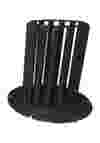ECTFE (Halar) stands as one of the tougher plastic materials available. Because Halar machined parts have such a low permeability to liquids, gases, and vapors, the material has better chemical resistance and surface smoothness than other comparable materials, like PVDF. Against corrosive chemicals, ECTFE stands virtually unaffected. This includes strong acids, bases, and organic solvents used in aggressive chemical environments.
It also holds a broad service use temperature. It can maintain its structural integrity even at temperatures well below 0°C — tolerating temperatures as low as -70°C (-94°F). Additionally, this plastic can also hold against higher temperatures, maintaining strength up to 150°C (302°F).Having such a broad range, ECTFE has a breadth of uses in several different industries.
Regarding its nonstick properties, the materials' low coefficient of friction results in its grease-free nature. As it does not require any further lubricants to maintain operation, It can take high amounts of friction, and its high strength minimizes the amount of wear on the product. Many in the food processing and chemical industry choose Halar for parts that need it as lining or as an industrial protective coating from other materials in its environment.
However, with these high performance aspects, there comes the manner of cost. Partially due to its excellent weather abilities, Halar is more expensive than most plastics and is more difficult to machine than others.
.jpg?format=pjpeg&width=100&quality=10)
